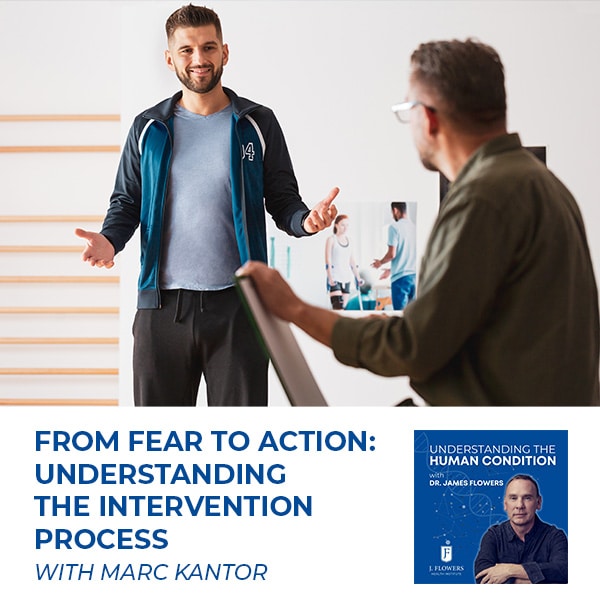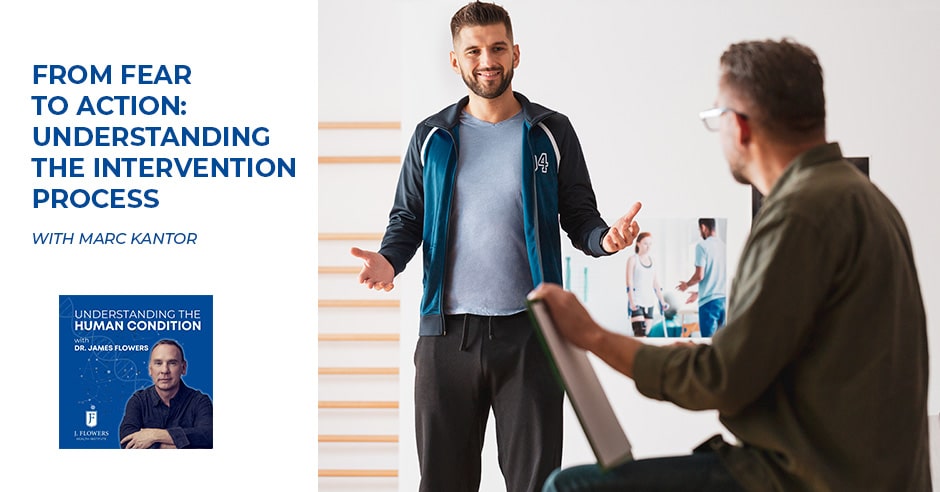
Interventions aim to impact the human condition by helping individuals see themselves as they truly are, rather than through the distorted lens of addiction or untreated mental illness. This process is challenging because their brains have been hardwired by years of substance abuse or mental health issues. Essentially, Marc Kantor is asking people to make logical decisions with a brain that is not functioning logically. Marc enjoys sharing his own story of recovery, but other topics that are important to us including co-dependency, trauma and intergenerational trauma, binge eating disorder, attention deficit disorder, compulsive behaviors, spirituality, and the gift of desperation. Dr. Flowers will ask Marc about his transformation and his road to J. Flowers Health Institute.
—
Watch the episode here
Listen to the episode here
From Fear To Action: Understanding The Intervention Process With Marc Kantor
I’m excited to welcome Marc Kantor from South Florida, from Boca Raton. Marc, welcome. I’m so glad that you had time and carved it out to be here with me on this episode.
This is a real honor for me. I was looking forward to this.
I’m super happy about that. I just want to read a bit of a bio, but I want you to introduce yourself I have a few things to say. Marc, of course, everybody knows that he’s a professionally trained addiction and mental health interventionist. Marc is also the author of the book, How to Do an Intervention, A Step-By-Step Guide for Parents.
He’s also the Founder of South Florida Intervention. Marc is a native of Long Island and a graduate of American University. He spent twenty years in commercial real estate in New York and Washington DC before making a significant career shift, which I hope to talk to Marc about and why that shift happened. Most recently, I’m super excited to announce here on our show at J. Flowers that Marc has joined in addition to his intervention practice. Marc is going to be doing some representation out in the world of J. Flowers Health Institute right here in Houston. We’re super excited about that, Marc.
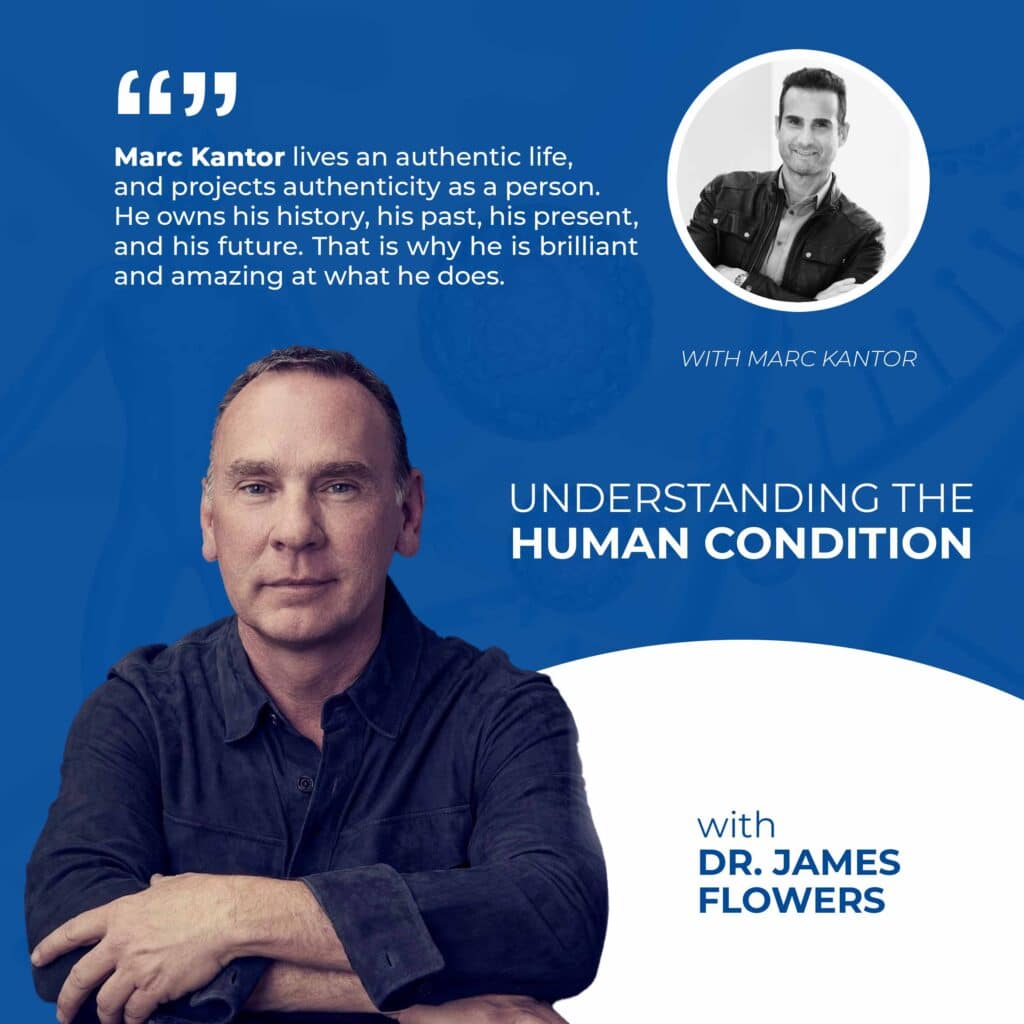
It’s exciting. Thank you. Thanks for having me.
Interventionist
The first thing I’d like to talk about since I said talking about you are an interventionist is why don’t you talk about what is an interventionist, what you do as an interventionist, and how interventions impact the human condition.
That’s a great question, thanks for asking it. An intervention is, in a way, an organized conversation that is choreographed. As an interventionist or choreographer of the intervention, surprisingly, my role can be quite little when it comes to the intervention. I always say if I’ve done my work, my preparation work with the family the right way the day before, and sometimes I’ll spend the entire day with the family, and we’ll talk about all kinds of things. We’ll talk about how we sit, who reads, what order, boundaries, and how we de-escalate.
If I’ve done my work correctly, then the next day, the intervention, which I usually do early in the morning, I should be doing very little. I should just be filling in some blanks, been doing very little. Now, that I think about it, intervention is not necessarily the intervention on the individuals. The intervention on the family. I just talked about, how unless the whole family system makes a shift, nothing’s going to happen. It’s not good enough to just get an individual into treatment over there for 30, 60, or 90. Real change has to take place for this to work.
I’m glad to be talking about interventions and the way that you prepare. As you said, you prepare for the intervention the day before or even probably several days before. What do you do, Marc? You and I both get these phone calls and every interventionist I know gets these phone calls from time to time. In these phone calls that they get, they’ll say, “Marc, I need you in Washington DC this afternoon. We’ve got to do an intervention on my daughter tonight.” What do you do when a family in crisis is feeling that it’s frenetic and such a crisis that they want you to act right then and fly and do the intervention today?
I have had those. Some of the time, the right response is doing the intervention the next day or getting on the plane that night. A lot of times, it’s gaining the trust of the family and then slowing it down a little bit. Unless the person is in jail or the hospital, they’re in some time-sensitive compromised situation. I’m going to lean on, “Let’s do this smart. Let’s plan for this. Let’s think this out.”
Now, something to consider is that, and I was just talking to someone about this, twenty years ago, if somebody went out, you didn’t have Fentanyl which is immediate. If you were a drug user or an alcoholic, yes, those things are going to kill you, but they’re not going to kill you this afternoon so you do have all the time.
However, when it comes to the drugs that are on the street today, time is of the essence. A good friend of mine says nobody has the luxury of a relapse anymore. I’ve had times where I’ve flown down to Costa Rica. I’ve come down to Houston once to collect a young woman who is out of prison. Those are things that were time sensitive but usually, I like to work smart, but expedient. I just want to do it the right way.
Nobody has the luxury of a relapse anymore.
I’m glad to hear you say that. I’ve spoken to some interventionists over the years who will say, “I will never do an intervention on the same day.” It’s never that urgent because it’s important to have the family trained before the intervention, but I agree. I tend to so much more agree with what you’re saying. Time can be of the essence, and you’re right, I don’t think anyone can afford a relapse because we don’t know what they’re going to relapse on and what’s going to happen when that relapse happens.
How To Do An Intervention
I have seen you in action, I’ve seen you in the field, I’ve known you for a long time, and know that you will turn on a dime and immediately run to the airport, get on a plane, and fly away. I just think I commend that. I think it’s important and I also know that when you feel like there is time, you’ll take that time and educate as much as possible before. I think that’s great. The other thing I think is important about an intervention is the book that you wrote. It’s How To Do An Intervention, A Step-By-Step Guide For Parents. I work with so many families and so many individuals around the world so I’m going to stick with children right now.
Adult children or adolescents and adult children who run the family system as an addict. Then, they keep the family hostage. They’re a terrorist sometimes. I think that this book is important for families. Tell our audience a little bit about the book that you wrote. The importance of educating the family and the role of the parents or loved ones in an intervention.
As I said before, you and I were talking before the show. The change has to take place with the family and the family system, the parents. That’s what the book does. It talks about that and talks about some of the steps I take to prepare for an intervention. One of the things that I talk about in the intervention is that if you’re going to do it yourself, you can’t be both the parent and the interventionist.
I talk about recruiting a family friend, your family pastor, or your family rabbi to take that role, which is going to end badly for them anyway. To do that role and how I do things, some of my philosophies on interventions. I always do the interventions early in the morning. It is because we know where the person is. They haven’t started drinking or using it yet, and it gives us the upper hand.
I’m not a fan of negotiating treatment with an addict. If they go to treatment and they’re working, they’re doing the work, and they feel like they’d be better off, we can have that discussion. A lot of times, manipulation is sneaky. I’ve had parents call me and they’ll say things like, “He or she just called,” and they’re glad they’re in treatment and they’ve said, “You’re right. I need to be here but this isn’t the right place for me.”
That’s a manipulation. A big one that we all hear a lot is young adults and adolescents threatening to kill themselves, which is a serious threat because, on the one hand, we always take that seriously. We never know and we’ll have to be very careful. On the other hand, it is often used as a manipulation by young adults and adolescents. You can’t assume it is but it is used. Hearing that, it’s going to stop you on a dime.
I see that practically every single day just like you and I see every day the things that you and I talk about. Something that I’d love to talk about, and by the way, that does not only go for the adolescent or the young adult. You and I see that whether it’s a husband and wife, whether it’s a grandmother or grandfather, whomever the identified patient is that’s in treatment. It’s not age-related. The person will call and say, “Thank you. I’m glad I’m in treatment. This isn’t the right place.”
Many people will say that. My advice is whether you’re a parent, a husband, a wife, or a spouse, we’ll talk about where to get your book later, but read Marc’s book about a step-by-step guide for parents, and I’ll say families, and learning more about an intervention and your role as that loved one. It’s very important to understand that the loved one is going to continue manipulating until you stop allowing the manipulation. Until you do your work.
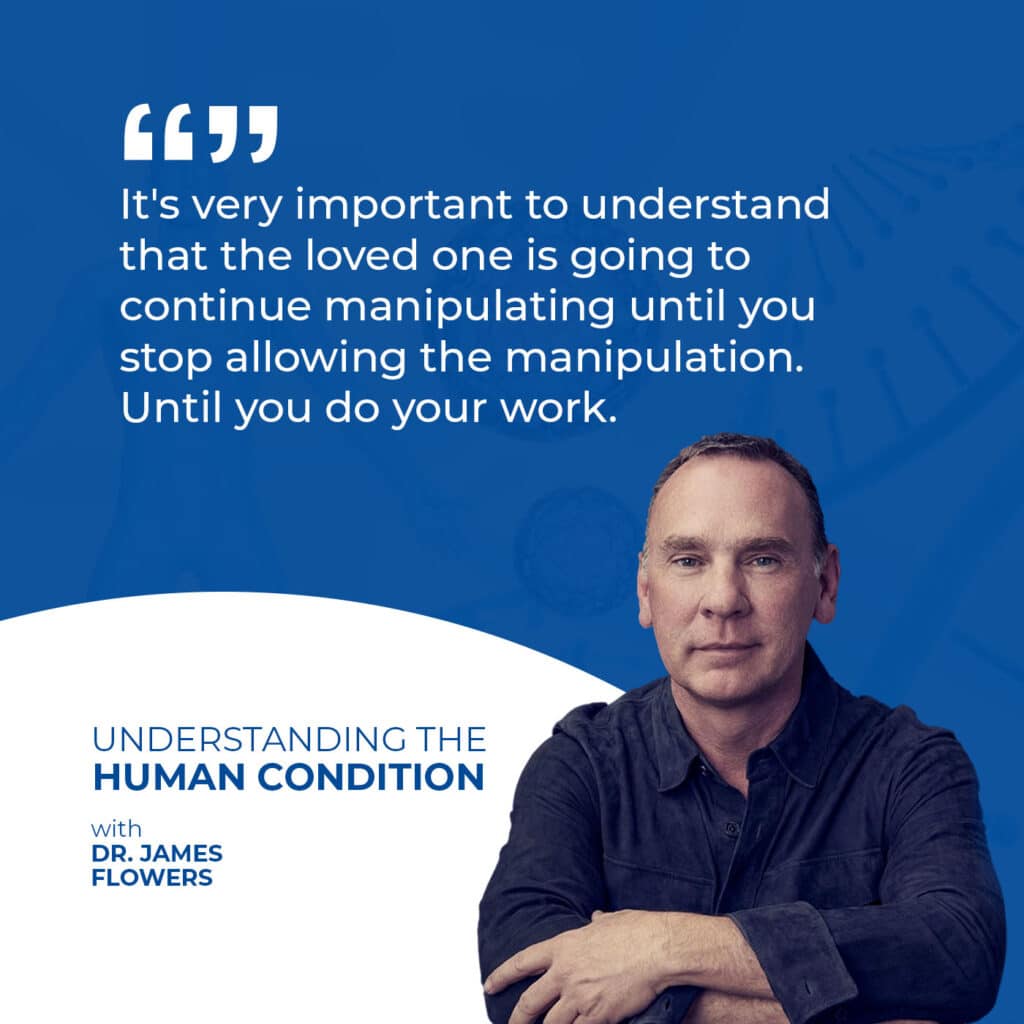
That goes to one of my strategies is I typically like to put people in treatment a little bit further away from home. If they’re here in South Florida, I want them to be in Houston. If they’re in California, I want them to come to you. The reason is because inevitably, they’re going to come up with, “I want to leave.” They’re going to want to leave against medical advice. They’re going to want to try to run the show.
If we set some of these things up in advance where there are these natural barriers, it’s one thing if you’re near 20 minutes from home, they’d jump in an Uber and they’d go home. The other thing is if it’s a plane ride away and they don’t have money on them, the parents have the money or different things you can do to slow the roll and be able to intervene.
I do want to point out and I think you’ll appreciate this in the generation you were open and I grew up in is, young people today talk to their parents in a very different way than we talk to our parents. My daughter talks to me in a way that I would never talk to my dad. When she was born, one of the things I said was, “I never want her to be afraid of me.” Let me tell you something, she’s not. She’s a great girl, and she’s doing great, but we have a closeness that her parents didn’t have.
Recovery
You worked in commercial real estate, which is a world away from interventions and recovery, but you worked in commercial real estate for 20 years, both in New York and DC. Then, you made a transition. Talk to me, and that’s all a part of your story. I’d love to hear about your story. Before you do that, I’m going to throw one more thing out there to talk about because I know it’s part of your story as well.
That is at J. Flowers Health Institute, I see a lot of Jewish families. We see Jewish families from all over the world that fly into Houston and work with J. Flowers Health. What I’ve talked to you about, what I’ve talked to my Jewish friends about in the community is that there is a lot of trauma and intergenerational trauma within the Jewish world, of course.
I see in Jewish men in particular a high level of anxiety that’s a consistent thread in the people with whom I work who are Jewish. I know that you don’t mind me saying that you’re Jewish. I would love to have you talk just a little bit about your story from commercial real estate into your recovery story, and then also that intergenerational trauma.
I was in commercial real estate for 20 years, probably about 17 years too long. I had some very good years. I had some very bad years but the last few years, I just wanted to get out of it. I had a good position with a small commercial real estate firm in Bethesda, Maryland, which is a suburb of Washington, DC.
I was just burnt out. I would sit in my office, and I’d run my fingers through my hair saying to myself, “I got to get out of here. I got to get out of here.” I didn’t know where it was. On a whim, my wife and I decided that we were going to move to South Florida. That we needed to change. We moved with our then fourteen-year-old daughter to South Florida, which I debated and I weighed the moving from one of the most intellectual places in the country to a place that can be a little bit more loose, a little more free.
We got down here, and I promised myself that I’m not done with commercial real estate. I’ve been sober long enough to know that we’re doing a geographical. I got down here and I promised that I wouldn’t get into commercial real estate. One of the first things I do is take a job at a commercial real estate firm because not that I want, but it’s what’s familiar. When we fear we default to the familiar side of what we know.
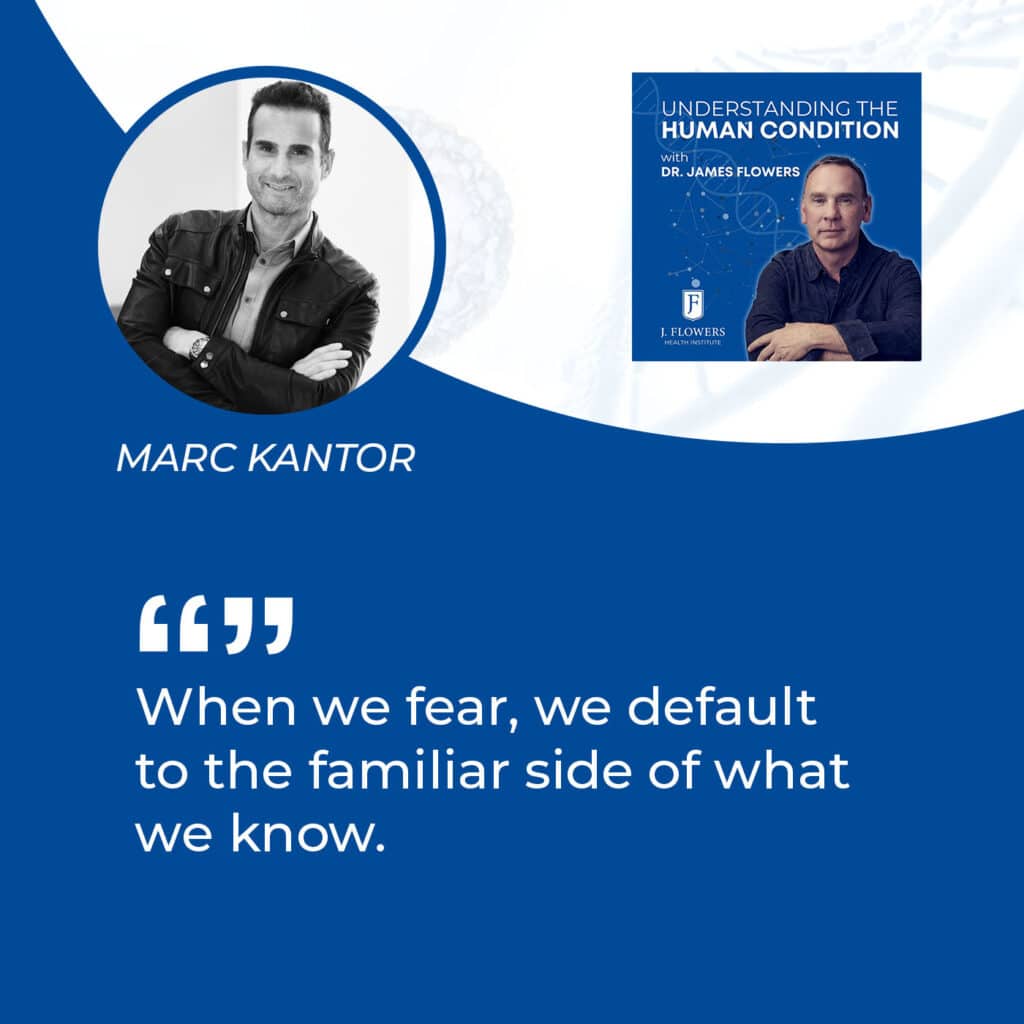
It’s not as good as a job. Everything is less than. The first day I walked in there, I said to myself, “What am I doing here?” I have no intention of doing anything they’ve hired me to do. In short order, I’ve reverted to running my fingers through my hair again. Now, I’m saying instead of, “I got to get out of here,” I’m saying, “If I don’t get out of here, I swear to god, I’m going to kill myself.”
I fell into this spiritual crisis that lasted three or four months and I remember being in the gym, in the shower, and having my palms out, and the water hitting me. I said to myself, “I can’t drink. I can’t have an affair, and I can’t kill myself. Those are the rules.” One of them, you definitely can’t come back from, and the other two would be pretty darn hard. That would be difficult too. There would be uphill climbs.
I went through this for a long time. I didn’t see the answer, and I didn’t know what to do. I look back now and I see those times as that’s when my higher power, God, or your spirituality, whatever is clearing the path to the next thing. I was having dinner with my daughter who is fourteen years old. We’re sitting in the kitchen having dinner, and she looks up at me and she says, “Dad, why don’t you start doing interventions?”
At age fourteen, she said that.
She was familiar with interventions because I participated in one for a friend a couple of years back. I was intrigued and started taking the certification courses and wanted to do something, but it was fear that kept pushing me back into commercial real estate. A deal that would come up or this is the big deal or that’s the big deal. Some things just pull us back. She had known that. She and I are very simpatico, and she said, “Dad, why don’t you start doing interventions?”
It was like, at that moment, the weight of the world fell off my shoulders, and I knew that was something that I could do. I had the skills and the knowledge to do it. That weekend, I just started writing out the business plan, and she helped me make a website. The website’s been done four times over since but yes, it was an incredible, God moment, and a miraculous moment in my life. Yet my situation felt very complicated and the answer was simple. It was amazing.
Sometimes we can’t see the forest for the trees. It was right in front of you and yet your fourteen-year-old daughter said, “Why don’t you start doing interventions?” and it became your passion. Something that you are brilliant and amazing at. You’re brilliant and amazing at many things, but intervention is certainly one of your big passions in life. You’re very successful at doing that at South Florida Interventions. How do people reach you, Marc, and learn more about interventions and talk to you about interventions, their family, or something that they’re going through?
Reach Marc
I’m glad you asked because I just googled myself and I’m easy to find. Yes, I’m sure we’ll link it here, but my website is SouthFloridaIntervention.com. Also, they can reach me through the JFlowersHealth.com website. The other thing you asked about is intergenerational trauma. This is something that took me years to appreciate. I had my trauma as a child that played a significant role in my life that I would not allow myself to have. I’m glad to tell you the stories as we move through but that incident of trauma was simply an excuse for weakness.
The incident of trauma can simply be an excuse for weakness.
Now, Dr. Flowers, if you had come to me and told me that you had the same experience, I would say, “No. That’s a real trauma.” That means something, but I wouldn’t allow myself to have it. As I started to understand trauma within myself, and I understood it, I started to understand it through working with other people on their traumas and their history.
My story doesn’t start when I was born. My story starts in 1904 when my father’s father was dropped off at an orphanage in Poland. If you don’t understand it, it’s easy to say, “What does that have to do with anything?” The attachment, the loss of his family, poverty, the lack of love that he received, and both World Wars. He had a brother who was with him, who one night, just left the orphanage, and he never saw him again. He never knew what happened to him. Then, my grandfather went to Germany, and that’s when he met my grandmother. Of course, they had to flee Germany and they got to the United States in 1937, which was just with a minute to spare.
They had a very hard life, but my father was born into this family in 1942 and they were all about survival. They didn’t have the luxury of entitlement. They didn’t have the luxury of choice. My father tells a story all the time about the summer, his mother would take him and his sister to the pool and they’d have to decide whether they’re taking the bus there or back. They had to walk one way. They couldn’t afford to go both ways.
My father grew up with a dad who was very angry all the time. Real repressed anger. Did not like people. A yeller. Hard to communicate with. While my father was much better than he was, he still had that trauma. He still grew up under an emotionally abusive father. When I was born in 1972, the World War II happened in 1945. It’d only been 27 years. We’re in 2024.
September 11 was only 23 years ago, and we still think about that every day. That affected our lives but those events just moved through the generations. In my whole life, I could feel that something wasn’t right. I had fear and I had anxiety, which you were talking about. I also questioned myself if I was not good enough.
It’s a funny thing because if you’re like me, the day you discover drugs, I was a doctor shopper. I was a very sheltered addict, I have to tell you. I was strictly a doctor shopper but it’s not like you say, “This is horrible that I’ve discovered drugs.” For me, I discovered a solution. It’s like, “Wow. Where has this been my whole life? This is exactly what I’m looking for.”
Intergenerational Trauma
Marc, talk a little bit about your experience having a daughter and the fact that intergenerational trauma is real. Just as you said, your story begins in 1904 and it goes from generation to generation. It is truly passed down in our bodies, in our tissues, in our bones, in our brains, in our chemistry, and in our behaviors.
How can you or the families make sure that intergenerational trauma is treated early or looked at early for you and it’s, for instance, in your daughter’s life? How do you make sure that she lives a healthy, thriving life? What do you do as a parent when you understand as well as you do that she probably suffers from some intergenerational trauma herself?
For sure. We unwittingly pass it down. I think the thing is I have a saying that sometimes the best way to help another person is to work on yourself. I think that’s true in the intergenerational trauma. My dad was 30 years old when I was born. Had he been working on that, had he been in therapy, had my mom been in there?
She came from her situation and they’ve been in therapy working on it. Would that have made my life different? The answer is yes. For a long time, I say, no, that has nothing to do. Again, if I were smart enough and strong enough, that would have mattered, but it does. Look, in the early ‘70s, how many people were working on their PTSD?
Maybe LSD, but not PTSD.
Which has now come back, it is now a subject again, but I think that you’ve got to work on yourself. There’s no way you can be there for someone else.
Marc, that’s true. I often heard in my family, that the buck stops with me or it ends with me. In my own family, which I’ve talked about on podcasts, in lectures, and talked to you about, but coming from a family of addiction that passes through generations in my family and then the trauma that my family has experienced, it’s the same thing.
If my mom and dad or my grandparents had done their work, but they didn’t do that back then much at all. They weren’t in New York and they didn’t do psychoanalysis. They didn’t take care of themselves in that way but for people like you and I in our generations, we understand that we can stop that intergenerational trauma. We can do things for our health to make us healthy and keep us healthy.
There’s not a Tuesday that doesn’t go by that I meet with my psychiatrist every morning, every Tuesday from 10:00 to 11:00. We must do our work. For someone like you, I’m in the trenches every day treating people. You’re in the trenches every day doing interventions, talking about recovery, and living a life of recovery. Your work can’t be your recovery. You’ve got to do your recovery work and your therapy.
You do have to do your work. Your work cannot be your recovery but also, I think that work for me has come in many different forms over the years. A huge fan of the 12-step programs. I love meetings but I also have something that helps me is working out, in the physical that helps me a lot. Sleeping and nutrition are important.
You do have to do your work. Your work cannot be your recovery.
For me, I’m always very willing and very open, and this may be somewhat unusual. I’m always looking, and this could be some of my AA training looking to see what my role is where have I participated in this, or why am I taking this action. One thing I’m a believer in is nobody does anything for free. With parents who are enablers, and we were talking about this, for example, they get something out of that. There is some upside to it. Then I’m not saying that they would intend to cause harm to their child. Of course, but they are getting something out of it.
There is some reward, and that is the child may be very good at making the parent feel like when they do what he wants, you’re the best parents, you love me, and you get that reward. It’s, “Why do I do this? What do I get from it? Why do I constantly overeat? Why am I overspending? What am I getting from it? What’s the payoff here?”
Authentic
That’s exactly right. Marc, another word that comes to my mind with you as we end this episode is what I want our readers to learn about you. I think this is one of the most overused words, but it’s a word that I mean when I think of you, and that’s authentic. That you live an authentic life, and project authenticity as a person. You own your history, your past, your present, and your future.
You take care of yourself and you do things to make sure that you are going to continue to be successful on your terms and whatever that success looks like for you and your family. I just much appreciate that. I want to say thank you for doing this episode. Thank you for being now a part of J. Flowers. Thank you for all of the interventions that you’re going to do to save many people and place them wherever they need to be placed in this world.
Thank you for having me be part of J. Flowers. That is huge. I would only have considered associating with a program that I truly look up to.
Thank you very much.
I truly admire you. I’ve been meaning to tell you this one little thing. I was having coffee with an interventionist. We’re talking about J. Flowers. He had heard either you or Claudia speak at a conference. He said to me the note that he had written in his book was that Flowers equals House, as in Dr. House. Yes, nobody else can figure it out. Dr. Flowers can. That was the note that he wrote in his book when listening to, I believe it was you who speak.
That just gave me chills, and I appreciate you saying that. While I don’t claim to be the Dr. House and be Dr. House, that’s what I feel every day. I do not work. I just get up and live, I love helping people, and I love helping solve puzzles. That’s what we do here, put a jigsaw puzzle together and find those missing components to help people live the best life possible and allow them to thrive again. That makes me feel good. It validates what we do. Thank you for saying that. Everyone, you can find J. Flowers Health at JFlowersHealth.com. Give me a call at (713) 205-1493. You can also find Marc Kantor on your website.
SouthFloridaIntervention.com and my telephone number is (202) 390-2273.
Thank you, everybody, for reading. That’s all for Understanding The Human Condition. We’ll see you again very soon. Thank you very much.
Thank you.
Important Links:
- Marc Kantor – LinkedIn
- SouthFloridaIntervention.com
- How to Do an Intervention, A Step-By-Step Guide for Parents
- @HelpForAddiction on Instagram+
About Marc Kantor
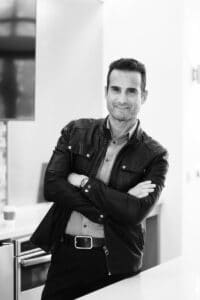 Marc Kantor, a professionally trained addiction and mental health interventionist. Marc is the author of How to Do an Intervention: A Step-by-Step Guide for Parents and the founder of South Florida Intervention. A native of Long Island and a graduate of American University, Marc spent twenty years in commercial real estate in New York and Washington, D.C. before making a significant career shift. Most recently, Marc has joined the J. Flowers Health Institute in Houston.
Marc Kantor, a professionally trained addiction and mental health interventionist. Marc is the author of How to Do an Intervention: A Step-by-Step Guide for Parents and the founder of South Florida Intervention. A native of Long Island and a graduate of American University, Marc spent twenty years in commercial real estate in New York and Washington, D.C. before making a significant career shift. Most recently, Marc has joined the J. Flowers Health Institute in Houston.


